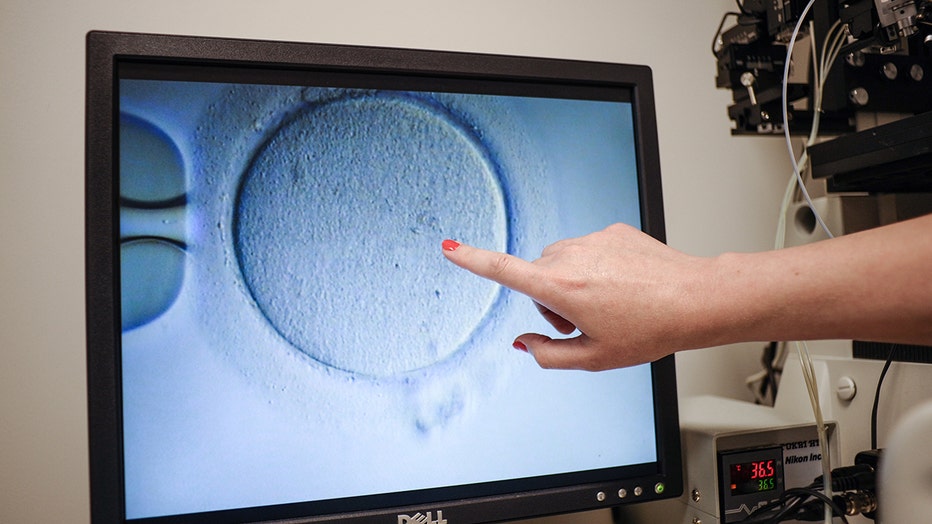Alabama fast-tracks IVF legislation after controversial Supreme Court ruling

Alabama frozen embryo controversy
Alabama ruled frozen embryos are children. But what could this mean for mothers looking to use the treatment and frozen embryos across the state. Jasmine Matlock with M&H Legal Services breaks it all down.
MONTGOMERY, Ala. - Alabama lawmakers are moving fast to approve measures this week to protect in vitro fertilization clinics from lawsuits in response to last month’s Supreme Court ruling which found that frozen embryos created during fertility treatments can be considered children under Alabama state law.
Gov. Kay Ivey, a Republican, is expected to sign one of the two bills into law. Either of the two bills would give legal protection for fertility clinics.
At least three clinics paused IVF treatments after the court ruling to assess their new liability risks. The ruling has caused many doctors nationwide to worry about possible national implications of the court decision.
The bills were both advanced by legislative committees on Tuesday.

An embryologist shows an Ovocyte after it was inseminated at the Virginia Center for Reproductive Medicine, in Reston, Virginia. (Credit: IVAN COURONNE/AFP via Getty Images)
Lawmakers are expected to give final approval to one — or maybe both — on Wednesday and send legislation to Ivey, who could sign one into law the same day.
What’s in the legislation?
Both the state Senate and the House are advancing identical legislation that would protect IVF providers and their employees from civil lawsuits and criminal prosecution over the destruction of or damage to an embryo.
Both bills remain silent on whether embryos outside the body are legally considered children.

Significance of Alabama's frozen embryo decision
Emma Waters with the Heritage Foundation joins LiveNOW's Andrew Craft to break down the Alabama Supreme Court's frozen embryos ruling.
While the legislation protects medical providers, lawmakers amended the bills on Tuesday to allow certain civil lawsuits against companies that make equipment used for IVF if the equipment damages or destroys an embryo.
Either measure, if signed into law, would take effect immediately.
Lawmakers said IVF providers have told them that the protections are enough to get them to resume services.
Alabama Supreme Court ruling
Last month, the Supreme Court found that frozen embryos created during fertility treatments can be considered children under Alabama state law.
The decision, issued in a pair of wrongful death cases brought by couples who had frozen embryos destroyed in an accident at a fertility clinic, could potentially leave clinics vulnerable to lawsuits and restrict access to treatment.
"This means the wrongful death of a minor act can be extended to all children despite what state they’re in – be it the embryonic state in the womb or born," Emma Waters, a research associate with the Heritage Association told LiveNOW from FOX.
While she said it will ultimately be up to the Alabama State Legislature to decide the details and breadth of this law, it has raised concerns among many Americans about whether treating the embryo as a child – rather than a property – could have broader implications regarding the practices of in vitro fertilization, known as IVF.
RELATED: Alabama Supreme Court ruling: Frozen embryos, IVF future explained
It could "substantially restrict access to a very vital fertility treatment that has helped countless folks today expand their families," Jason Griffith, a reproductive endocrinologist in Houston, told the Associated Press. "When you look at the percentage of pregnancies in the United States that result from in vitro fertilization, it’s around 2%."
It could also increase the cost of IVF for many families — although it’s unclear by how much — because of things like additional storage fees and liability costs, he said. One cycle of IVF, including all embryos transferred, now costs about $15,000 to $25,000, Griffith said.
Another possible ramification is that there will be fewer IVF providers, he said.
Dr. John Storment, a reproductive endocrinologist in Lafayette, Louisiana, said his state has a unique law that prohibits doctors from discarding any viable embryos that are still dividing — meaning they must be preserved and stored.
Storment agreed that the Alabama decision could have a ripple effect across the entire country.
"It’s one of the bigger things to happen in reproductive law in the last decade," he said.
This story was reported from Los Angeles. The Associated Press contributed.

